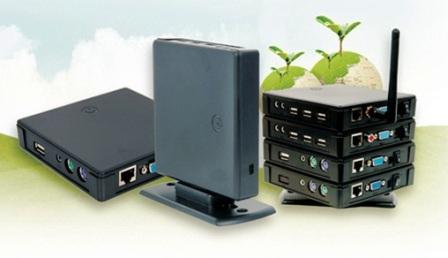What is the Thin Client ?
“Thin Client “ is a logical, not physical, construct. Thin Client applications are executed on a server and do not require client resident installation and the graphical user interface are is rendered to the client not moved to the client.
Why Thin Clients ?
Times are tough. Users are demanding anytime, anywhere access to data. And you need to keep your data secure. All while keeping costs down. Thin clients—the ideal solution for your operation if you’re concerned about the cost of PC replacement, data access and security. And keeping everyone happy with software support on all kinds of hardware.
A thin client is not a complete computer, meaning it has reduced or no local storage and reduced processing resources. This reduces capital expense at the desktop. Furthermore, the overhead costs associated with administration, maintenance, support, security and installation are significantly lower than a traditional PC. Excellex thin clients are a realistic alternative to the traditional costly PCs.

A Thin Client Architecture
- A Hardware/Software that runs application on a server, not on desktop.
- mouse click and Key strokes are sent over network to the server to process
- Clients can be a low powered PC or a Thin client device.
- They may not Have HDD, FDD, CDROMS, Cooling Fans, Very Low Processing Power.
Host PC Configuration
- 1 Remote User- Pentium 4, > 1.3 GHz, 512 MB RAM
- 2-3 Remote Users- Pentium 4 , >2.4 GHz, 512 MB RAM
- 4-7 Remote Users- Pentium 4, >3.0 GHz, 1 GB RAM
- 8-10 Remote Users- Pentium 4, >3.2 GHz, 2 GB RAM
- 11-14 Remote Users- Intel P4, >3.2GHz,3GB RAM
- 15-20 Remote Users- XEON 2.8GHz or XEON 2.4GHz Dual, 3GB RAM
- 21-30 Remote Users- XEON 3.2GHz or XEON 2.8GHz Dual, 4GB RAM
- 31-50 Remote Users- XEON E5506*2, 4GB*4 DDR3/1333 ECC REG
- 51-70 Remote Users- XEON E5506*2, 4GB*6 DDR3/1333 ECC REG
- 71-100 Remote Users- XEON E7520*2, 16GB*4 DDR3/1333 ECC REG
Benefits of Thin Clients
- Direct Savings
- Reduce desktop costs
- Significantly reduce staffing costs
- Significant reduction in desktop maintenance costs
- Virtually remove the need for desktop upgrades
- Remove desktop application upgrades
- Remove viruses from the desktop
- Reduction of training expense
- Reduction in bandwidth costs
- Reduction or eliminate remote office servers by centralization
- Reduced Power Consumption
- Significantly lower desktop asset purchasing cost
- Vastly reduced user downtime waiting for help desk response
- Less system downtime through better redundancy and disaster recovery capabilities
Strategic Benefits
- Application delivery on-demand
- Move desktop computing towards a utility model
- Applications available to all users anytime and anywhere
- Faster time to market
- Supports distributed business decision making
- Quick expansion through ease of deployment
- Enables corporate application standardization
- Reduced risk of data loss (since the data and applications are centralized)
- Supports homogeneous clients (Windows, Linux/UNIX, Minis/Mainframes)
- Improves remote user support
- Helps prevent theft of intellectual property (i.e. data)
- Eliminates games and non-business time wasting activities
- Lower TCO = Big Savings
Greater security. Real reliability. Easy management. And longer lifespan. It adds up to a lower cost of ownership. In fact, a recent Gartner study measured thin client TCO annual savings as high as:
- 79% downtime cost-per-user
- 16% capital cost savings
- 34% less in maintenance
- 19% less to operate
- 48% overall lower TCO




What is a thin client ? Thin Clients Thin client in india Price for the thin clients Difference between thin client and thick client Benefits of a Thin Clients. Return on Investment in Biometric System Installations. what is an attendance system ? what is an Access Control System ? what is a Time Attendance System ? Time and Attendance Management System why Biometrics Access Control system ? Why a Computerized Attendance Monitoring System ? Attendance Software Reports What is a Fingerprints scanner ? Why CCTV (Closed Circuit Television) Cameras Dome Cameras Infrared Cameras VDP (Video Door Phones) Card based Hotel Locks Why intelligent Hotel Locks ? Why Fingerprint Locks ? Network Attached Storage (NAS) Server data storage What is a Firewall ? Firewalls for windows


 for
for